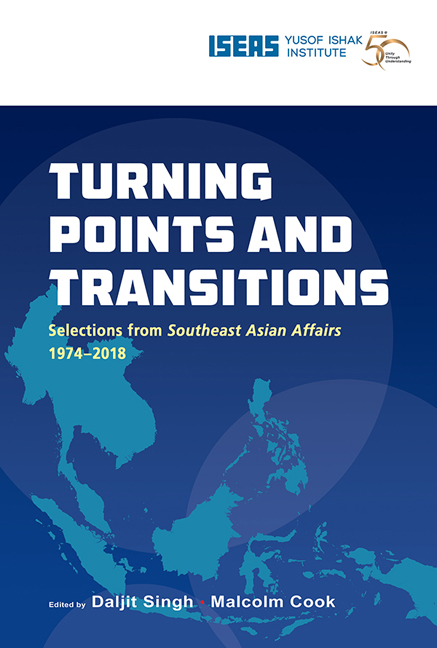Book contents
- Frontmatter
- Contents
- Message from the Director
- Foreword
- Foreword
- Introduction
- THE REGION
- BRUNEI
- CAMBODIA
- INDONESIA
- Indonesia's Armed Forces: Rejuvenation and Regeneration (1982)
- Indonesia: The Pancasila State (1985)
- The Indonesian Economy Facing the 1990s: Structural Transformation and Economic Deregulation (1990)
- A Year of Upheaval and Uncertainty: The Fall of Soeharto and Rise of Habibie (1999)
- Indonesia: The Regional Autonomy Laws, Two Years Later (2003)
- The Impact of Domestic and Asian Regional Changes on Indonesian Foreign Policy (2010)
- ISIS in Indonesia (2015)
- LAOS
- MALAYSIA
- MYANMAR
- THE PHILIPPINES
- SINGAPORE
- THAILAND
- VIETNAM
Indonesia: The Regional Autonomy Laws, Two Years Later (2003)
from INDONESIA
Published online by Cambridge University Press: 29 May 2019
- Frontmatter
- Contents
- Message from the Director
- Foreword
- Foreword
- Introduction
- THE REGION
- BRUNEI
- CAMBODIA
- INDONESIA
- Indonesia's Armed Forces: Rejuvenation and Regeneration (1982)
- Indonesia: The Pancasila State (1985)
- The Indonesian Economy Facing the 1990s: Structural Transformation and Economic Deregulation (1990)
- A Year of Upheaval and Uncertainty: The Fall of Soeharto and Rise of Habibie (1999)
- Indonesia: The Regional Autonomy Laws, Two Years Later (2003)
- The Impact of Domestic and Asian Regional Changes on Indonesian Foreign Policy (2010)
- ISIS in Indonesia (2015)
- LAOS
- MALAYSIA
- MYANMAR
- THE PHILIPPINES
- SINGAPORE
- THAILAND
- VIETNAM
Summary
Introduction
Indonesia is a fascinating amalgam of ethnicities, languages, cultures, and religions, united by history, by a common national language, by political will and sometimes by sheer force, and spread over thousands of separate, distinct, and often distant islands. That such a country would have a high degree of regional autonomy would seem to make sense but surprisingly the regions in Indonesia until recently did not have much autonomy and were administered mainly by the central government. This led to a lot of resentment towards the centre and particularly towards Java and the Javanese who dominate in politics and in the central government.
Addressing a call for more regional autonomy, the Habibie government passed new laws that promised the broadest autonomy to the regions and the Wahid government adopted regulations under the new laws. The laws and regulations came into force on 1 January 2001. This decentralization has been referred to by some as the “Big Bang” — Indonesia moved from a government structure that was highly centralized to one of the most decentralized in the world (at least on paper) and did so in about 27 months from the People's Consultative Assembly (MPR) decree opening up the regional governance reform in October 19981 until the coming into force of the laws on 1 January 2001. Many believe that no country has ever decentralized so much so suddenly.
This article will look at the provisions of the new regional autonomy laws. It will, in particular, examine the political context that led to their adoption, their contents including their shortcomings, the many difficult tasks faced during the implementation of the laws over the past two years, and the possibility of amending the laws. It will then look very briefly at the separate autonomy laws adopted for special regions.
I have elsewhere made a detailed legal analysis of the laws and regulations just before their coming into force and also written on the legal consequences of the regional autonomy laws on regional minorities in Indonesia. Jurists should refer to these other articles for a more detailed legal analysis. The purpose of this article will be to explain some of the legal difficulties generated by the law to non-lawyers and to give a more general overview of the law and its early implementation over the last two years — though still from a jurist's point of view.
- Type
- Chapter
- Information
- Turning Points and TransitionsSelections from Southeast Asian Affairs 1974-2018, pp. 326 - 339Publisher: ISEAS–Yusof Ishak InstitutePrint publication year: 2018



